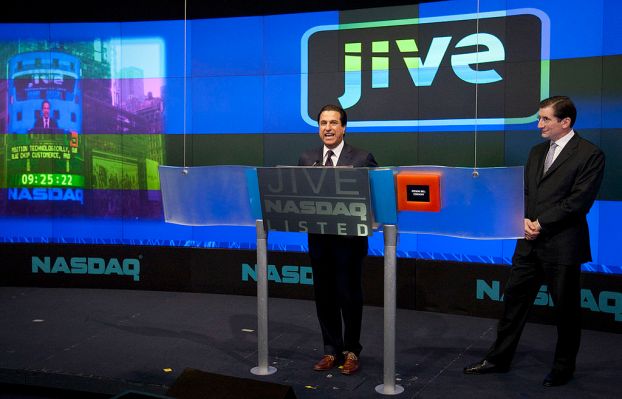Jive, a community collaboration software company that was one of the biggest Enterprise 2.0-era success stories, going public in 2011, announced today it had agreed to be acquired by ESW Capital’s Wave Systems for $462 million. It will become part of the Aurea family of companies.
In the end, it appeared to be a kind and healthy exit for Jive shareholders. ESW paid $5.25 a share to purchase the company, representing a 20 percent increase over the average of Jive’s closing stock price for the three months ending on April 28, 2017. It had closed on Friday at $5.05 a share. Needless to say, Jive’s board jumped at the offer and voted unanimously to approve the deal.
But not everyone saw it that way. Ray Wang, founder and principal at Constellation Research, called it a “fire sale” on Twitter and reported that investors lost millions.
The plan is to integrate Jive into Aurea’s customer experience management platform. The acquisition gives Aurea a tool for creating internal and customer-facing communities, a key piece in today’s customer service environment. It also gives them access to Jive’s customer base, which includes T-Mobile, Schneider Electric, McAfee and EMC.
Scott Brighton, CEO of Aurea, sees the community component strengthening the overall platform. “Jive, in combination with Aurea, enables us to bring customer experience and employee and customer engagement together,” he said in a statement.
Rachel Happe, principal at Community Roundtable, a firm that helps companies implement communities, wasn’t surprised by the move. “The social software market has gotten much, much bigger and Jive was facing competition from both bigger players and small niche players, without the benefits that either provide. What happens next for Jive and its customers is less clear as few details have been revealed,” she wrote in an email.
Alan Pelz-Sharpe, principal at Deep Analysis and who has been watching this space for many years, sees it as a good deal for ESW and Aurea. “ESW Capital has made a good deal ensuring the long-term and profitable future of Jive. In my experience of the firm, [Jive] not only has good albeit legacy software, they do take their customers seriously and have a very engaged customer base. All in all everything a PE firm is looking for,” he told TechCrunch.
It would appear with this sale we are seeing the official end of the Enterprise 2.0 era, which had its heyday in the 2006-2012 time frame. Jive, along with Yammer, Socialcast, Socialtext and a host of others, came to prominence during this time and brought a lot of promise of changing the way businesses communicate internally and externally.
It all began in 2006, when then Harvard professor Andrew McAfee (he has since moved onto MIT), coined the term Enterprise 2.0. Instead of getting bogged down in long email threads, employees could talk directly to one another in teams and communities via a more natural communications interface. They also could create their own content with blogs, wikis and other tools instead of relying on a group of experts to publish the content for them. Eventually this would extend outside the company, as well.
The era peaked when Jive went public in 2011 and Yammer was sold to Microsoft for $1.2 billion in 2012, representing two of the biggest success stories of the time.
A couple of years later Slack was released and has taken the enterprise by storm. It, along with the recent release of Workplace by Facebook and Microsoft Teams, has created a new generation of more modern tools.
Alan Lepofsky, an analyst with Constellation Research who covers collaboration and community in business, sees the era ending, not so much because of the recent additions, but because the biggest companies, including Microsoft, Salesforce, Cisco and IBM, finally caught up with Enterprise 2.0 functionality.
“The big guys caught up and filled the gap that the original e20 vendors temporarily filled,” he said. As for Aurea, Lepofsky sees it giving them a tool to compete with Salesforce Communities in the customer experience space.
Perhaps it was inevitable that Jive, one of the last of that original wave of companies standing, would be sold. It’s actually a good match on its face — the best deal Jive shareholders could hope for at this point, while giving Aurea a solid tool community and collaboration for its platform.
